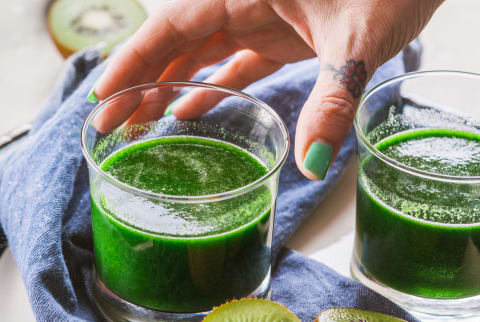Advertisement
The Do's And Don'ts Of Reducing Chronic Inflammation


Inflammation has always been a medical mystery, but now it has become an enemy of long-term health. On the one hand, when your skin turns red, swollen, and painful after you burn yourself, which triggers acute inflammation, the response is normal and beneficial. Extra red blood cells, immune cells, and antioxidants are rushing to the wounded site to heal it. But carried too far, inflammation can be fatal, as when someone is too burned to recover.
Only in the past few decades has it dawned that low-level chronic inflammation, which usually goes completely unnoticed, plays a part in many lifestyle disorders such as hypertension, heart disease, cancer, and Alzheimer’s. Chemicals known as inflammation markers can enter the bloodstream in various ways: From the intestinal tract (so-called leaky gut), as a reaction to infection, or through the action of the immune system in other internal ways. The slow drip, drip of inflammatory markers can take years to create major impairment, which means that each person must tailor his lifestyle to counter them.
Diet alone isn’t enough to keep chronic low-level inflammation at bay, but it’s a good start. By adopting an anti-inflammation diet, you aim at two positive results: keeping the micro-organisms in your intestines healthy and flourishing, thereby preventing the seepage of toxic chemicals into the bloodstream. There is also the indirect benefit that a healthy digestive system sends signals of well-being along the vagus nerve to the heart and brain.
The millions of bacteria that inhabit the intestinal tract are an essential part of our total DNA, contributing thousands of separate genomes. Together this vast colony is known as the microbiome. Here are some essential points to know:
- The gut microbiome is different from culture to culture. In each of us, it is constantly shifting in response not just to diet but to stress and even emotions.
- Because of its genetic complexity, a "normal" gut microbiome hasn’t been defined yet.
- It is generally believed, however, that a flourishing, healthy gut microbiome is founded on a wide range of natural foods rich in fruits, vegetables, and fiber.
- The modern Western diet, which is low in fiber but high in sugar, salt, fat, and processed food, may be seriously degrading the gut microbiome.
- When the gut microbiome is damaged or degraded, bacteria begin to release so-called endotoxins—the by-products of microbial action. If these toxins leak through the intestinal wall into the bloodstream, markers for inflammation are triggered and persist until the toxins are no longer present.
- In our new book, The Healing Self, we give complete details about setting up your own personalized anti-inflammation diet. You can start by adopting individual changes, working up to a complete regimen.
We divide our advice into "Do" (adding something good to your diet) and "Undo" (taking something bad out of your diet). We tell people to choose only one change at a time, seeing how well they can follow it, and only then moving on to the next change.
DO
- Add some anti-inflammatory foods to your diet (see below).
- Include more organic food in your grocery shopping.
- Increase the fiber in your diet.
- Take a probiotic supplement (widely available a health food stores).
- Switch to olive or safflower oil.
- Drink coffee one to five times a day.
UNDO
- Cut down sharply on your sugar intake.
- Cut out junk food and fast food.
- Throw out stale food, including stale cooking oils and leftovers more than a day old.
- Reduce overall fat intake.
- Reduce salt intake.
- Use no alcohol or at most one drink a day (there is some evidence that a single drink is anti-inflammatory while adding more alcohol is definitely inflammatory).
A natural, organic, whole-food diet should be maintained over a lifetime to keep low-level inflammation at bay, but nutritional research has uncovered specific foods that have anti-inflammatory properties.
Foods that fight inflammation:
- Fatty cold-water fish (such as salmon, tuna, mackerel, herring)
- Berries
- Tree nuts (such as walnuts, almonds, hazelnuts, etc., but excluding peanuts, a groundnut)
- Seeds
- Whole grains
- Dark leafy greens
- Soy (including soy milk and tofu)
- Tempeh
- Mycoprotein (from mushrooms and other fungi)
- Low-fat dairy products
- Peppers (e.g., bell peppers, various chilies—the hot taste isn’t an indication of inflammatory effects in the body)
- Tomatoes
- Beets
- Tart cherries
- Ginger and turmeric
- Garlic
- Olive oil
In their online health publications, Harvard Medical School adds a few other items to the list:
- Cocoa and dark chocolate
- Basil and many other herbs
- Black pepper
Leaving aside their anti-inflammatory effects, these are all healthy, whole foods, and making them a mainstay of your diet can only be beneficial. However, the science is still out on whether all of these foods actually have an anti-inflammatory effect in the body and also what effect, if any, they have on the microbiome. Still, fighting chronic low-level inflammation isn’t incidental or just one in a long list of positive lifestyle changes. It could be the key, along with stress reduction, to enjoying wellness for many decades into a healthy old age. There is every reason to go down this road and no reason not to.
Adapted from an excerpt from The Healing Self: A Revolutionary New Plan to Supercharge Your Immunity and Stay Well for Life by Deepak Chopra, M.D., and Rudolph E. Tanzi, Ph.D., with permission from the publisher.